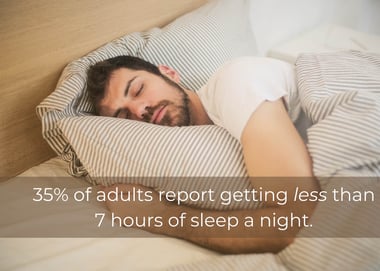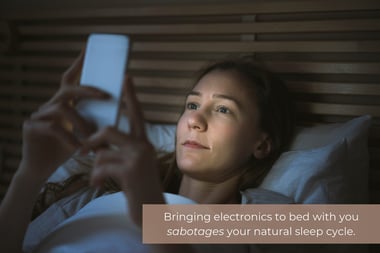Think back and reflect on your last seven nights of sleep. If you had to guess, how many of those nights would you say you slept well and for enough time? Be honest with yourself. Half? Less than that? Sleep deprivation is a major health crisis, and it affects more people than you’d think.
An alarming 1 in 3 adults don’t get enough sleep.1 Thankfully, improving the quality and duration of your sleep isn’t as difficult as you might think. With a little planning and determination, you can wake up most mornings feeling well-rested and fresh.
Why Is Sleep So Important?
Everyone knows humans need sleep to survive, but few realize how detrimental poor sleep is to our health. Sleep allows our bodies to recharge and heal and is vital for every body system.
Failing to get enough sleep reduces your cognitive function, impairs the immune system, and damages your mental health. Sleep is also important for healing from an illness or injury. A study that compared the speed at which diabetic foot ulcers healed in people who were sleep-deprived compared to those who weren’t found we heal much slower when we don’t get enough sleep.2
Lack of sleep is also known to worsen symptoms of mental illness and is proven to be a direct cause of depression.3
Effects Of Poor Sleep
Sleep deprivation is a serious health concern that contributes to problems such as:
- High cholesterol

- Obesity
- Heart disease and high blood pressure
- Increased stress and mood imbalances
- Suppressed immune system
- Higher risk of cancer
- Fertility and reproductive problems
- Overall reduced life expectancy
- Heartburn
Your Brain and Sleep
The pineal gland in your brain produces serotonin and melatonin, two major hormones responsible for regulating your sleep patterns. Serotonin is a neurotransmitter that promotes your mood and keeps you alert. At the end of the day, your brain converts serotonin into melatonin to tell your body that it’s time to sleep.4
An imbalance of either serotonin or melatonin can disrupt your sleep cycle. If you don’t produce enough serotonin, you’ll be groggy and susceptible to mood swings. It also means your body won’t produce enough melatonin to make you feel tired at night. If you do not have an adequate rise in melatonin in the evening, you will likely have difficulty getting a good night's sleep.
Human sleep cycles revolve heavily around light, and sunlight is one of the most effective ways to stimulate the natural production of sleep hormones.4 Studies show that exposure to sunlight early in the day not only produces a surge of serotonin, but also helps your body clear out any residual melatonin, and thus you feel awake, alert, and in a better mood. Light exposure earlier in the day also helps set your body clock or circadian rhythm. This in turn helps your body start releasing melatonin earlier in the evening and in an optimal amount. This helps you fall asleep easier and stay asleep during the night.
Circadian Rhythm and Sleep Cycles
Your circadian rhythm helps tell your body when to sleep and when to feel awake.5
Circadian rhythm is primarily based on light cues, especially immediately after waking up and right before bed. Since your body reacts best to bright light in the first hour after waking up, you should try to get your daily dose of sunlight within this timeframe for maximum benefits. The key is to get morning light exposure on your eyes, so try to avoid wearing sunglasses or prescription glasses that have blue light blocking lenses. It is also important to know that your brain is especially sensitive to light in the two hours right before bed. This is the worst time to stare at your phone because it keeps your brain from entering sleep-mode. The blue light from screens and lightbulbs suppresses your natural production of melatonin, tricking your body and brain into thinking that it is time to be awake.
After you fall asleep, your body follows an intricate schedule. Sleep falls into two main categories; rapid eye movement or REM, and non-rapid eye movement, or NREM.
There are 4 stages of NREM that last about 90 minutes after you fall asleep.6 NREM sleep is restorative. Your body undergoes healing and repair during this time, and NREM deep sleep is critical for memory consolidation. After NREM, you fall into the much shorter cycle of REM sleep. During REM sleep, your body becomes deeply relaxed, yet your brain is much more active. That’s why dreams most often happen during REM sleep. REM sleep is vital for processing your daily experiences and emotions so that you can optimally learn from them.
Importantly, your brain cycles through the different sleep stages throughout the night. However, NREM and deep sleep predominates in the earlier part of the night, and REM sleep in the early morning hours. Thus if you go to sleep too late, or awake too early, you may lose one or the other disproportionately. There is more to sleep than a simple total number of hours. Of note, the age-related decline in deep NREM sleep is one reason that our memories increasingly fail us as we get older. Thus, if we are careful to optimize our sleep hygiene, we can help to preserve optimal brain and memory function.
Causes of Poor Sleep
It’s important to isolate what’s causing you to sleep poorly so you can address it. Everyone is unique in this regard but the culprits often include:
- Stress/psychological factors — stress activates your sympathetic nervous system or “fight or flight” response, releasing a flood of hormones like cortisol and epinephrine into your body. Stress hormones cancel out the relaxation hormones you need for a good night's rest.
- Circadian disruption — too much screen time and other sources of artificial light before bed trick your brain into thinking it’s daytime and sabotages your sleep-wake cycle.
- Timing of meals can also be a key factor in sleep quality. Your liver and gut have their own “clock,” one that is affected by meal timing. Eating close to bedtime activates your digestive system and can impair sleep.
- Sleep apnea — sleep apnea is a disorder that causes long pauses of breathing while asleep. Not only does this disrupt sleep, but it can pose a serious health hazard if untreated.
- Jet lag — traversing time zones and changing the length of a day throws off your circadian rhythm.
- Delayed Sleep Phase Disorder (DSPD) — DSPD means you feel awake and alert late into the night and sleep best during the early morning hours. If you’ve ever been described as a “night owl”, you may have Delayed Sleep Phase Disorder. While uncommon among adults, this circadian rhythm disorder is prevalent in teenagers.5
If you’re unsure of how well you’re sleeping, try taking the Pittsburgh Sleep Quality Index (PSQI) evaluation. It’s a 5-10 minute survey that gives you a score of 0 to 21 and provides helpful insight into your sleep habits. A low score indicates that you’re at risk for the negative effects of sleep deprivation.
The Lyme Connection
If you’re living with Lyme disease, you know that the smallest things can have the biggest impact on your health. This is especially relevant when it comes to sleep.
Many people with Lyme or other chronic illnesses find that their underlying health issues contribute to poor sleep, for a variety of reasons. Unfortunately, this can be a negative feedback loop. We know that Lyme patients who don’t get enough sleep have worse episodes of pain and inflammation than those who sleep well.7 They also have an increased risk of hormone and neurotransmitter imbalances. Growth hormones in particular have been noted to be reduced in Lyme patients who suffer from sleep disorders.8
Lyme disease also increases your risk of sleep apnea, weakened immune system, and blood sugar irregularities.8 If you’re suffering from Lyme or another chronic illness, it’s of utmost importance that you get the right amount of high-quality sleep. If you need help, reach out to our team.
How To Improve Your Sleep
Noise cancellation or masking
Environmental noise is an obvious nemesis to good sleep. Try to keep a quiet bedroom when possible. Wear earplugs if you can. If your neighbor’s dog won’t stop barking or your roommate can’t stop clanging around in the kitchen, try drowning out the noise. One study found that white noise machines dramatically improve sleep quality for those who find themselves unable to avoid disruptive background noise.9 A good air filter can also double as a white noise machine.
Comfort level
You won't sleep well if you don't optimize your sleep environment. Since your body temperature drops when we sleep, feeling overheated is a common cause of poor sleep. Make sure your room is on the cooler side before climbing into bed. A good mattress and pillows are also helpful.
Your brain can’t tell the difference between the sun and the artificial light emitted from electronics. Too much screen time throws off your circadian rhythm, especially when it’s right before bed. To avoid temptation, keep electronic devices out of the bedroom. At the very least, keep them out of reach from your bed.
Regulate light exposure
Start your days by throwing open the shades letting in as much sunlight as you can, and try to get outside early in the day. This helps your body into a state of wakefulness and releases serotonin. As bedtime approaches, decreasing artificial light exposure helps nudge your body to relax and start secreting melatonin. Keep your bedroom as dark as possible throughout the night and remove any unnecessary electronics.
If work or other means forces you to adopt a non-traditional sleep schedule, utilize black-out curtains and sleep masks to block out daylight and trick your body into thinking it’s nighttime.
Yoga, qigong, and meditation
Up to 42% of people suffering from a sleep disorder also suffer from anxiety.10 Yoga, qigong, and meditation are powerful relaxation techniques proven to reduce stress and improve sleep.11 Sleep yoga is a slow practice meant to ready the body for sleep. Qigong is another practice that we are passionate about, and we created a special course that is available here. Meditation also helps clear your mind of the worries you may try to take to bed with you and helps to balance your nervous system.
Supplements
Many who struggle to sleep have found success with herbal and dietary supplements. Melatonin, valerian root, 5-HTP (synthesized serotonin), hops, L-theanine, lemon balm, and magnesium are only a few options that may improve sleep.12 Remember to always consult with your care team before starting new medications or supplements.
Stay Consistent
Sleep is not cumulative. Getting 12 hours one night won't replenish your depleted sleep debt from the rest of the week. It’s important to get a healthy amount of sleep every night in order to function well the next day.
Some obstacles make high-quality sleep seem elusive, or even unrealistic. Parents of young children and those with jobs that require shift work may find good sleep habits especially difficult. However, with planning and support, there is a lot that you can do to improve your sleep.
Make healthy sleep a priority for your well-being. Come up with a realistic bedtime routine and deviate only when you must. Challenge yourself to find what works for you and weave it into your daily routine. Try keeping a sleep diary to track how well you're sleeping and identify what doesn't work for you.
If after all this, you’re still suffering from the effects of poor sleep, book a consultation with us here. Also, be sure to watch this special presentation from our founder, Sunjya Schweig, MD, who was invited to speak at a virtual conference hosted by the Icahn School of Medicine at Mount Sinai about the relationship between sleep and wellness. As sleep specialist Dr. Robert Schriner once said, “we need to convince 100 percent of the public that good sleep is as necessary as exercise and nutrition for optimal health.”13
At CCFM, we wholeheartedly agree.
References:
- Centers for Disease Control and Prevention (2016). 1 in 3 Adults Don’t Get Enough Sleep. Retrieved from https://www.cdc.gov/media/releases/2016/p0215-enough-sleep.html. Accessed 17 December 2020.
- Maltese, G., Fountoulakis, N., Drakatos, P., Shah, D., Patel, K., Sharma, A., Thomas, S., Pengo, M. F., & Karalliedde, J. (2018). Elevated obstructive sleep apnoea risk score is associated with poor healing of diabetic foot ulcers: a prospective cohort study. Diabetic medicine: a journal of the British Diabetic Association, 35(11), 1494–1498. Retrieved from https://pubmed.ncbi.nlm.nih.gov/30022522/. Accessed 17 December 2020.
- Wang, Y. Q., Li, R., Zhang, M. Q., Zhang, Z., Qu, W. M., & Huang, Z. L. (2015). The Neurobiological Mechanisms and Treatments of REM Sleep Disturbances in Depression. Current neuropharmacology, 13(4), 543–553. https://www.ncbi.nlm.nih.gov/pmc/articles/PMC4790401/. Accessed 17 December 2020.
- Mead M. N. (2008). Benefits of sunlight: a bright spot for human health. Environmental health perspectives, 116(4), A160–A167. https://www.ncbi.nlm.nih.gov/pmc/articles/PMC2290997/. Accessed 17 December 2020.
- Suni, E. (2020, September 5) What is Circadian Rhythm? The Sleep Foundation. https://www.sleepfoundation.org/circadian-rhythm. Accessed 17 December 2020.
- Cleveland Clinic (2020). Sleep Basics. Retrieved from https://my.clevelandclinic.org/health/articles/12148-sleep-basics#:~:text=During%20NREM%20sleep%2C%20the%20body,might%20get%20only%2030%20minutes. Accessed 17 December 2020.
- Weinstein, E. R., Rebman, A. W., Aucott, J. N., Johnson-Greene, D., & Bechtold, K. T. (2018). Sleep quality in well-defined Lyme disease: a clinical cohort study in Maryland. Sleep, 41(5), 10.1093/sleep/zsy035. https://pubmed.ncbi.nlm.nih.gov/29452400/. Accessed 17 December 2020.
- Bransfield R. C. (2018). Neuropsychiatric Lyme Borreliosis: An Overview with a Focus on a Specialty Psychiatrist's Clinical Practice. Healthcare (Basel, Switzerland), 6(3), 104. https://www.ncbi.nlm.nih.gov/pmc/articles/PMC6165408/. Accessed 17 December 2020.
- Farokhnezhad Afshar, P., Bahramnezhad, F., Asgari, P., & Shiri, M. (2016). Effect of White Noise on Sleep in Patients Admitted to a Coronary Care. Journal of caring sciences, 5(2), 103–109. https://www.ncbi.nlm.nih.gov/pmc/articles/PMC4923834/.
- Staner L. (2003). Sleep and anxiety disorders. Dialogues in clinical neuroscience, 5(3), 249–258. https://www.ncbi.nlm.nih.gov/pmc/articles/PMC3181635/. Accessed 17 December 2020.
- Wang, W. L., Chen, K. H., Pan, Y. C., Yang, S. N., & Chan, Y. Y. (2020). The effect of yoga on sleep quality and insomnia in women with sleep problems: a systematic review and meta-analysis. BMC psychiatry, 20(1), 195. https://www.ncbi.nlm.nih.gov/pmc/articles/PMC7193366/. Accessed 17 December 2020.
- Kim, S., Jo, K., Hong, K. B., Han, S. H., & Suh, H. J. (2019). GABA and l-theanine mixture decreases sleep latency and improves NREM sleep. Pharmaceutical biology, 57(1), 65–73. https://pubmed.ncbi.nlm.nih.gov/30707852/. Accessed 17 December 2020.
- Schribner, R. (2009). The 2009 Sleep in America Poll. Sleep Foundation. Collierville, Tennessee.







